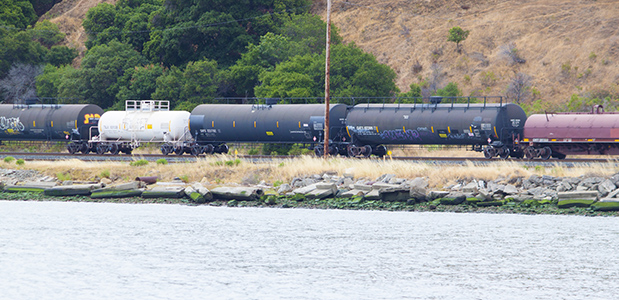Long freight trains, with tank cars full of crude oil, chugging daily along San Francisco Bay’s shore? That’s the oil industry’s plan—to expand the shipment of crude oil into the Bay Area by train.

Shipping more crude oil into the Bay Area by train will create an unacceptable risk of oil being spilled along the shore of San Francisco Bay and its tributaries. Photo by Susie Biehler
By Deb Self
Published: October, 2014
Long freight trains, with tank cars full of crude oil, chugging daily along San Francisco Bay’s shore? That’s the oil industry’s plan—to expand the shipment of crude oil into the Bay Area by train.
Shipping lots more crude oil here by rail would create a huge risk of oil being spilled into the Bay and its tributaries. Oil spills from trains are alarmingly common; last year in the United States, more than a million gallons of crude oil were spilled as a result of rail accidents.
Some of this oil would be explosion-prone light crude from the North Dakota Bakken fields. An exploding tank car in a densely-populated Bay Area community could be deadly and cause terrible property damage.
Some oil shipped here would be heavy, dirty crude from the Canadian tar sands. Tar sands crude oil, once it is refined, yields petroleum coke, a byproduct that China burns as a cheap industrial fuel. It’s even more toxic and polluting than coal, and is often stored outdoors in huge piles before being shipped overseas. Petroleum coke dust contains cancer-causing chemicals and can easily be washed and blown into the Bay and nearby communities.
There’s also the big danger of a train accident on tracks near the Bay shore. Oil in the Bay can make the water unsafe for recreation, contaminate beaches and kill birds and other wildlife.
In response to these threats, Baykeeper is working on several fronts.
We helped orchestrate the passage of a new state law (SB 1319) that provides California’s rivers, lakes and creeks with oil spill protections previously given only to coastal waters. This means that the Bay’s entire watershed will now have critical protections, including emergency cleanup crews ready to respond if an oil spill occurs. The new law also expands the scope of the California agency that rescues and cares for wildlife injured by an oil spill, which had been threatened with having to close.
However, the surest protection is to prevent oil spills in the first place. That’s why Baykeeper is working to halt the big increase of crude oil slated to come here by train.
In order to bring in more tank cars full of oil, Bay Area refineries need to expand their rail yards and other infrastructure. We’re urging regulators and city governments to reject these expansion plans and refuse to provide the necessary permits.
We recently advocated for the Benicia city government to reject the Valero refinery’s plan to enlarge its rail yard. Crude oil would be shipped to the refinery via train through Suisun Marsh and along the shore of Suisun Bay, a San Francisco Bay inlet and important wildlife habitat area. Oil spilled along Suisun Bay could quickly spread throughout San Francisco Bay.
In June, Baykeeper and our coalition partners won a unanimous vote from Oakland’s City Council to oppose the rail shipment of oil—and also coal and petroleum coke—through the city. Our partners included the Sierra Club, Communities for a Better Environment and the West Oakland Environmental Indicators Project.
And we have been fighting to keep a long-closed Pittsburg oil storage facility and shipping terminal from being reopened and expanded. However, it appears that the Chevron refinery in Richmond has been able to sneak through a permit to expand its rail yard, keeping the process secret.
Whether we live close to or far from a refinery, every Bay Area resident has a stake in whether the amount of crude oil shipped here via train should be dramatically increased. We need to say no to long trains of tank cars full of crude oil rumbling along our shores.
Deb Self is Executive Director of San Francisco Baykeeper, www.baykeeper.org. Baykeeper uses on-the-water patrols of San Francisco Bay, science, advocacy, and the courts to stop Bay pollution. To report pollution, call Baykeeper’s hotline at 1-800-KEEP-BAY, e-mail hotline@baykeeper.org, or click “Report Pollution” at www.baykeeper.org.

